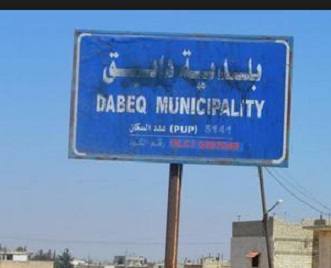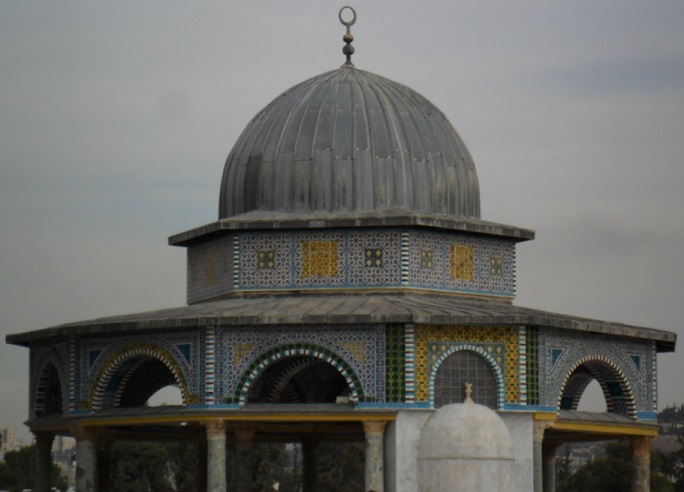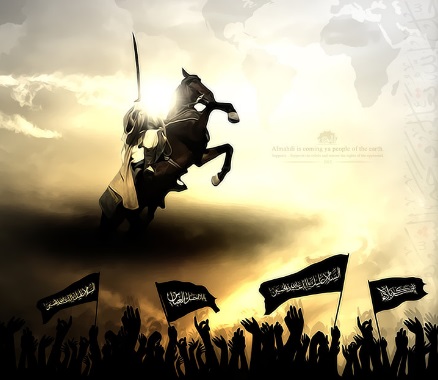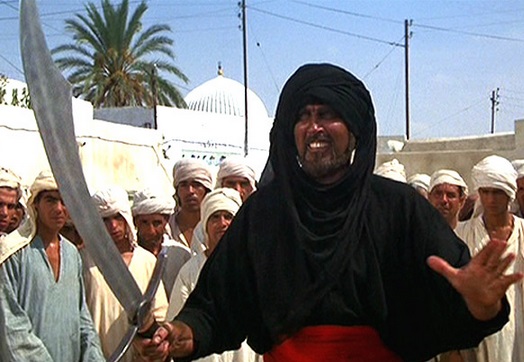Two weeks ago the Islamic State of Iraq and al-Sham (ISIS, or ISIL if you prefer to speak
of the “the Levant” rather than “greater Damascus) lost control of the town of Dabiq to Turkish-backed Syrian rebel militias. Readers of this site, and of my books—especially Ten Years’ Captivation with the Mahdi’s Camps—know that since its caliphal inception, in the summer of 2014, ISIS has been trumpeting the view that the Islamic eschatological
stopwatch had been set running and that the great apocalyptic battle at Dabiq, between Muslim and Christian forces, would
take place in or near Dabiq.
 Happiness is Dabiq, Syria, in your (Toyota) rear view mirror?
Happiness is Dabiq, Syria, in your (Toyota) rear view mirror?
Many journalists and analysts, both Left and Right, have taken their cues from Muslim leaders
and fighters opposed to ISIS and proclaimed the town’s liberation from Islam’s primary eschatologists to be a
“bitter blow” and even a “big defeat.” No doubt it’s the former—but is it really the latter, as my good friend and astute analyst Ryan
Mauro contends?
Disappointed
eschatological expectations are not unique to ISIS, but are a common occurrence in Islamic history (as well as in Christian—but
that’s a topic for another day), as I documented in my 2001 doctoral dissertation “Eschatology as Politics, Eschatology
as Theory: Modern Sunni Arab Mahdism in Historical Perspective,” in the spinoff book Holiest Wars: Islamic Mahdis, their Jihads, and Osama bin Laden (Praeger, 2005) and, most specifically, in a paper which I presented at a 2008 conference in Iran, “Through a Glass Darkly: A Comparison of Self-Proclaimed Mahdist States throughout History to the Theory of the (True) Mahdist
State Yet to Come.” Three major examples illustrate my point. Ibn Tumart claimed to be the (Sunni) Mahdi in 12th
c. Morocco and his al-Muwahhid (Almohad) followers went on even after his death (a fact hidden by the group’s inner
circle) to conquer most of North Africa and establish a Mahdist state which held, as the central article of faith, that the
founder had indeed been whom he claimed. The medieval (Shi`i) Fatimid rulers of Egypt claimed for over 200 years that
each of the sultan-caliphs was also the Mahdi present on earth, despite waning power and the inexplicable refusal of other
Muslims, as well as Byzantine Christians and Crusaders, to submit to this assertion. And the true believers in Muhammad
Ahmad as the “Sudanese Mahdi” (of Khartoum movie fame) refused to abandon him as such, even 13 years after his death, as explained in “The Man Who Believed in the Mahdi.” Reinterpretation of relevant hadiths (alleged sayings of Muhammad’s) and events is the key to
this kind of reality denial, as engaged in by the author of the latter. Muhammad Ahmad never ruled over the whole earth,
but only greater Sudan? Well, the Qur’an sometimes uses “earth” (al-ard) to refer to a single region.
He did not receive pledges of loyalty in Mecca? Recognition of the true Mahdi can be done in one’s “spiritual
Mecca.” He never led Jesus in prayer? We don’t know whether Jesus secretly might have come to earth in the
past and prostrated behind the Mahdi. No angels proclaimed Muhammad Ahmad’s Mahdiyah? They actually did—but
only the most pious Mslims heard them. And finally, what about other Muslim leaders’ rejection of his claim? The
true Mahdi has no need of such mundane assistance.
 Qubbat al-Silsilah, "Dome
of the Chain"--right next to Dome of the Rock, and the site where all humanity will queue up for Judgment, LONG after
the Mahdi and Jesus have ceased to rule.
Qubbat al-Silsilah, "Dome
of the Chain"--right next to Dome of the Rock, and the site where all humanity will queue up for Judgment, LONG after
the Mahdi and Jesus have ceased to rule.
Using such an absolving
hermeneutic, here’s what ISIS could say about the loss of Dabiq in light of the relevant hadith (number 6924
in that collection), which has been adduced in several issues of Dabiq
*The Romans (Byzantine Christians/Crusaders/Americans) had not yet “landed”
in any force
*A (Muslim) army had not yet come from Medina, because ISIS has not yet
conquered Saudi Arabia
*ISIS is not
yet holding any “Roman” [American] POWs.
*“We don’t have to actually hold Dabiq—the major battle just must take place near
there.”
Any or all of these rationalizations would likely hold water, in light of previous examples from Islamic history.
So ISIS can, and likely indeed will, simply move the eschatological goalposts: IF ISIS manages to procure some American (or perhaps Russian) soldiers as POWS AND the
Americans (or Russians) insert ground forces to rescue them AND ISIS takes over Saudi Arabia such that ”true Muslim”
armies could come from Medina, THEN the vital battle of Dabiq will be nigh. Look for
such exegesis in upcoming issues of ISIS’ new Rumiyah magazine, which even before Dabiq fell out of ISIS control had replaced the predecessor Dabiq magazine. (This new publication
Rumiyah—“Rome” in classical Arabic—may not indicate a loss of eschatological faith on ISIS’
part, as some contend, so much as a reinvigorated desire to take the fight to the “Romans” on their own soil and,
indeed, a revitalization of the intent to conquer them—and us.)
Indeed, ISIS’ rank-and-file, and probably even much of its leadership, truly would
believe their own exculpatory propaganda—for despite shoddy Western “analysis” such as The Economist has recently provided, ISIS’ eschatology is neither “nihilistic” nor a “flight of fancy”—and
in point of fact, it is not actually about the end of the world at all, but simply a description of how
the world becomes Muslim. In Islamic eschatology, the coming of the Mahdi, Jesus and the Dajjal (“the Deceiver,”
or “Antichrist”) ushers in the Islamic conquest of Earth, not its ultimate demise. (The actual End, along
with Judgment and consignment of souls to heaven and hell, takes place long after, in an entirely different realm of events.)
So ISIS can refigure hadiths and reinterpret events in ways that make sense to many of the millions of
Muslims who hold to traditional Sunni views of such matters (as I wrote about in 2012). Thus, ISIS’ loss of Dabiq may prove to be not its comedy of eschatological errors, but instead allow al-Baghdadi
to claims all’s well that, eventually, ends well.
 The Waiting Is the Hardest Part--but he WILL come, no matter who holds Dabiq!
The Waiting Is the Hardest Part--but he WILL come, no matter who holds Dabiq!
Time to get back in the saddle again--the eschatological one, that; it's been three months since my last post, thanks to knee surgery, teaching
again, writing, and sons playing football on different teams. God willing readers of this blog will forgive me--if they
haven't consigned me to the well out back of Jamkaran mosque.
Apocalypse--mainly, but not only,
Islamic--remains at the top of the headlines lately. ISIS is fighting to hold onto the town of Dabiq, in northern Syria--where it believes, as per relevant Muslim hadiths, that its forces will defeat a massive
Christian army and usher in the coming of the Dajjal, Mahdi and Jesus and (eventually) a global caliphate. Contra much reporting and analysis, however, belief in the Mahdi and attendant eschatological themes is
not limited to ISIS and "extremists" in the world's second-largest religion. This past July the state of Perak,
in Malaysia started investigating a chap claiming to be the Mahdi and that his "deviationist" group was stockpiling weapons and planning to proclaim their leader
as Mahdi in Mecca. In August of this year, following the failed military coup in Turkey, the head of that country's
religious affairs (what in the good old days the Ottomans called the "grand mufti") blamed the revolution manqué on that "fake Mahdi," Fethullah Gülen (the exiled neo-Sufi leader living in Pennsylvania).
Of course, Westernized, intellectual Muslims like Mustafa Akyol argue that the many hadiths about the Mahdi (and Jesus) making the world Muslim by force "might
be better read metaphorically." But this is also true of the Qur'an itself--and, unfortunately, a literalist exegetical
paradigm still holds sway, especially in Sunni Islam, and looks to continue to do so for the forseeable future (as I explained on national radio in 2015).
Never fear, however; for, as U.S. Presidential candidate
Hillary Clinton assures us, "I'm the Last Thing Standing Between You and the Apocalypse"--although whether she or her rival Donald Trump is actually the Dajjal remains to be seen.

